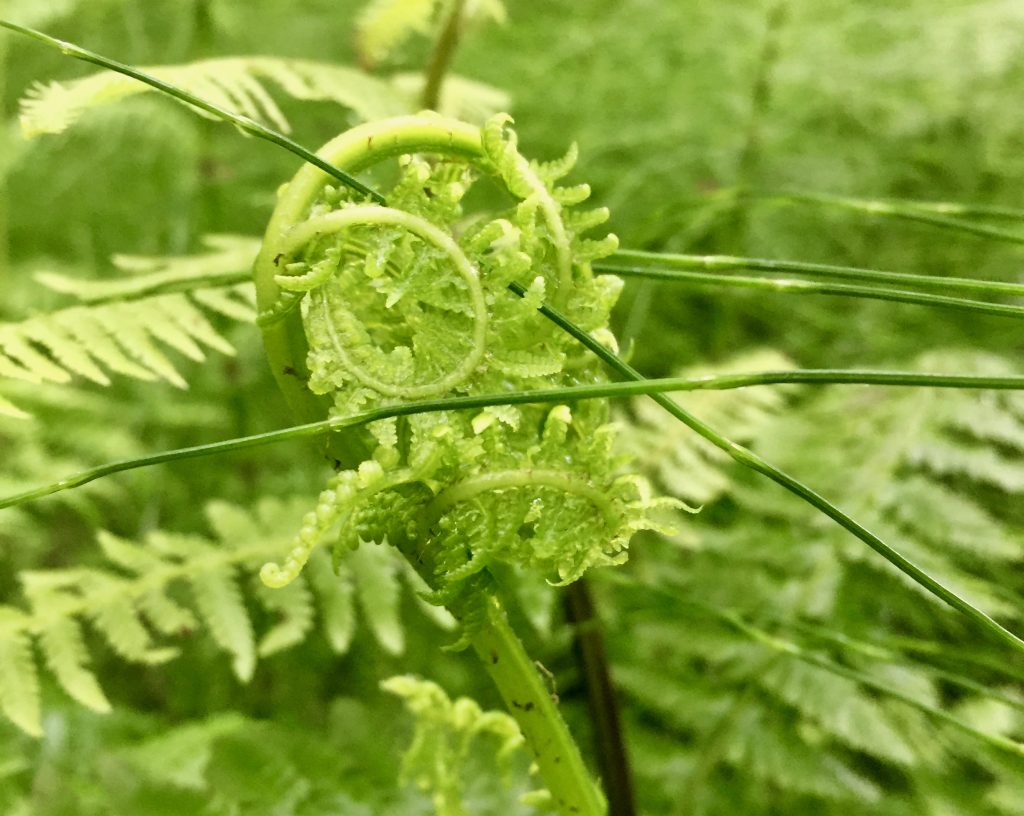
This originally appeared as part of the Daily Sip, a website from Charles LaFond, a spiritual companion, author, potter and fundraiser who writes from the southern cliffs of Whidbey Island; offering regular meditations and reflections on spirituality and church fundraising
Things unfurl in late Spring, opening to summer’s sunlight like Kai-the-dog when he rolls onto his back and opens his body to a vigorous belly rub. Vulnerable. hopeful.
Tight, circular balls of furry green wait on the ends of fern stalks, ready for the sun and Earth to collude as they push light through the forest canopy here on Whidbey Island. Spring is long here. And my favorite color, the yellow-green of Spring, is everywhere. In the mountains there remains the last gasp of the season of fiddleheads.
Fiddleheads have been a source of nutritious food since the late middle ages. Browned in butter (so that the butter toasts brown as well) with salt and pepper, the unfurled fronds of some lady-ferns are delicious and sustainable if one does not over-harvest from one plant. It’s best not to take more than a quarter the fiddleheads of any one lady-fern.
If left to unfurl, the summer will straighten the fern branches and leaves, arching back to gather as much light as possible and collect soft, misty rains.
The lives of plants and animals are to be envied insomuch as they live on the razor’s edge of now. They do not masticate on the past nor do they fret over the future. The simply exist and unfurl in order to stretch, collecting water and sunlight.
We humans unfurl as well. After a time of trauma or difficulty, having curled up into the psychic version of the fetal position, we begin, ever so slowly, to unfurl – tentatively at first and then with gusto, reaching to the heavens and bending towards the earth – both. Having unfurled, we metabolize life. The Mimosa Pudica (often called the sensitive plant,) when its fronds are touched, will pull back and close down in immediate reaction. The small tendrils recoil from a human touch in defensive action.
Dutch researchers have found that in time, even this plant will accommodate a touch. In the laboratory, when the mimosa plant was touched with drops of water, gather leaves immediately collapsed and closed-in as a defense to the touch. But after many drops over time, the plant realized that the water was a good thing and so stopped its plant-y closing when drops hit the fronds. And then (and this part freaks me out!) after no drops for weeks, researchers began to drop the drops of water onto the plant again and the plant remembered water and so, when drops hit the plant it did not close up.
Like the Mimosa Pudica plant, when we are hurt, we recoil, wilt and turn inward. It takes a long time to trust the drops again – to learn which ones nourish and which ones harm. The God who describes itself as “I am” is trustworthy. That drip of love is trustworthy. And that drip of love through others is usually trustworthy – though, like the mimosa plant, one may wish to test it out for a while before being sure.
The people who love us, like the God who loves us, are our water, our sunlight and our soil. Plenty in our lives will die; and those deaths, large and small, will fertilize the earth in which we are planted; giving our roots a foothold in flood and wind.
I am not sure what God is and am rather more sure as I age that God is much bigger and more complex than the names we call it and the descriptions we preach. However, I am sure that even when some of our unfurled fiddleheads get cut off by local cooks, the plant retains enough life to regenerate – to unfurl next year.
And in the meantime, all I ask is that if you cook fiddleheads, honor the life offered by using real butter. Blanch the fiddleheads for one minute. Then watch them as they simmer. Brown the butter; but do to burn the butter as they simmer. The line is thin. To get it right, one must watch. So stay in each present moment, watching, watching, watching.
The cancers of the spiritual life are the past and the future. They should only be used as data; never as maps, and never ever as entertainment for a bored or anxious mind. Like the Mimosa plant, we curl inward when in danger. But like the lady-fern, we have enormous potential to open, stretch and welcome water and light.
Do you have regrets from the past? Let them go. Do you have worries about the future? Let them go. In every present moment, you are that yellow-green of spring. Soft. Vulnerable. And full of potential if you will just relax and unfurl.

